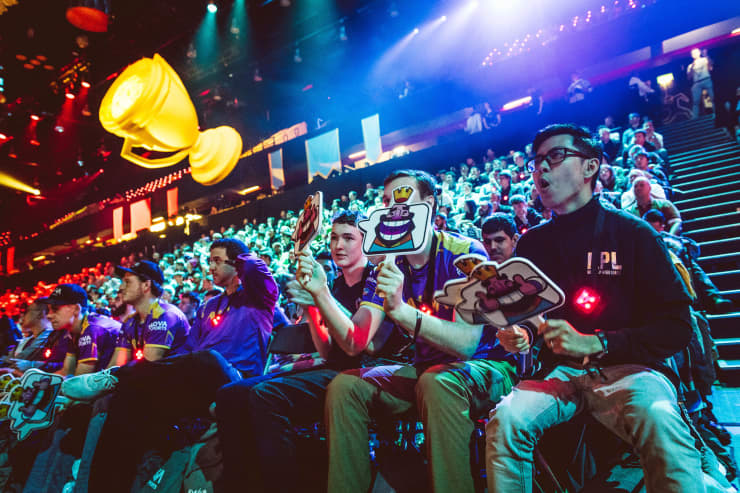| SPONSOR: Esports Entertainment $GMBL Esports audience is 350M, growing to 590M, Esports wagering is projected at $23 BILLION by 2020. The company has launched VIE.gg esports betting platform and has accelerated affiliate marketing agreements with 190 Esports teams. Click here for more information |

Here’s why esports can become a billion-dollar industry in 2019

- Research firms like Statista estimate that global revenues for the wildly popular, still nascent sector may even surpass that milestone this year — particularly because of the number of companies and investors getting in on the esports market.Â
- Estimates from Newzoo project that the global esports market will exceed $1.6 billion by 2021.
Electronic sports (esports) experts considered 2018 a landmark year that cemented the space’s potential as the next billion-dollar industry.
Research firms like Statista estimate that global revenues for the wildly popular, still nascent sector may even surpass that milestone this year — particularly because of the number of companies and investors getting in on the esports market. Estimates from Newzoo project that the global esports market will exceed $1.6 billion by 2021.
“When I look at 2018, I feel like it was the year that esports really started cracking into the mainstream,†Jack Etienne, owner of North American esports team Cloud9, told CNBC recently—. “To me it feels like we’ve broken a barrier that we’ve never attained before in esports.â€
Like other industry participants, Etienne believes the past year also laid down catalysts that will drive esports’ development going into 2019. This is particularly true in some key areas that he thinks are essential to building a more sustainable ecosystem for the industry. Getting in the Game
In October, Cloud9 became the world’s most valuable esports team after raising $50 million in Series B funding, leading Forbes to peg the team with a $310 million valuation. The same report also estimated that a total of nine esports teams worldwide are worth at least $100 million.
Those numbers have attracted attention from a number celebrities, including basketball legend Michael Jordan, who joined the ownership group for Team Liquid in October 2018.
Meanwhile, big-time investors like Mark Cuban have also taken stakes in esports-related entities for years, and traditional sports moguls have bought in. For instance Robert Kraft, who owns the New England Patriots, also paid $20 million to own the Boston-based team in Activision Blizzard’s Overwatch League prior to its launch last year.
Aside from the star-studded line of investors, 2018 saw a new rush of brands into the space. Last year, research firm Newzoo estimated that about 60 percent of the esports market’s revenue would come from sponsorships and advertising.
One big trend some esports players are betting on is the continued entry of non-endemic companies into the space. In 2018, a rush of non-gaming companies, from autos to telecom, struck deals and sponsored events, leagues and teams alongside more traditional tech and gaming-related names.
According to Naz Aletaha, head of esports partnerships at Riot Games, “our audience is predominantly digital first and that gives us different opportunities to engage in meaningful ways.â€
Using Riot’s “League of Legends†competitive scene as an example, she recently told CNBC that “the scale that we’ve achieved globally by operating 13 leagues has created the perfect ecosystem for brands to get involved.â€
These partnerships lead Aletaha to believe that some of the next big non-gaming brands to enter esports will be from three primary areas: Quick service restaurants, male grooming and apparel. All three stand to benefit from a space that is “not overly saturated yet†that also boasts a younger audience, Aletaha added.
Cloud9′s Etienne also expects that many of these brands will establish longer-term deals in the esports space. The number of brands wanting in leaves teams and companies in a position with more options to consider for their longevity.
“One of the things I need to balance out is I need to look at these brands,†he said. “Long-term partnerships are really starting to
[generate]
and dig in with that partner and start building some really great products and I want to do that, but I also want to sign partners†best suited to esports teams and companies, he said.
Creating longer-term deals will establish a more sustainable esports market that companies will also benefit from, according to esports experts.
“The longer you’re in the space, the more of an authentic layer you’re going to become, which really just helps win the hearts and minds of the audience,†explained Aletaha.
Source: https://www.cnbc.com/2019/01/20/heres-why-esports-can-become-a-billion-dollar-industry-in-2019.html